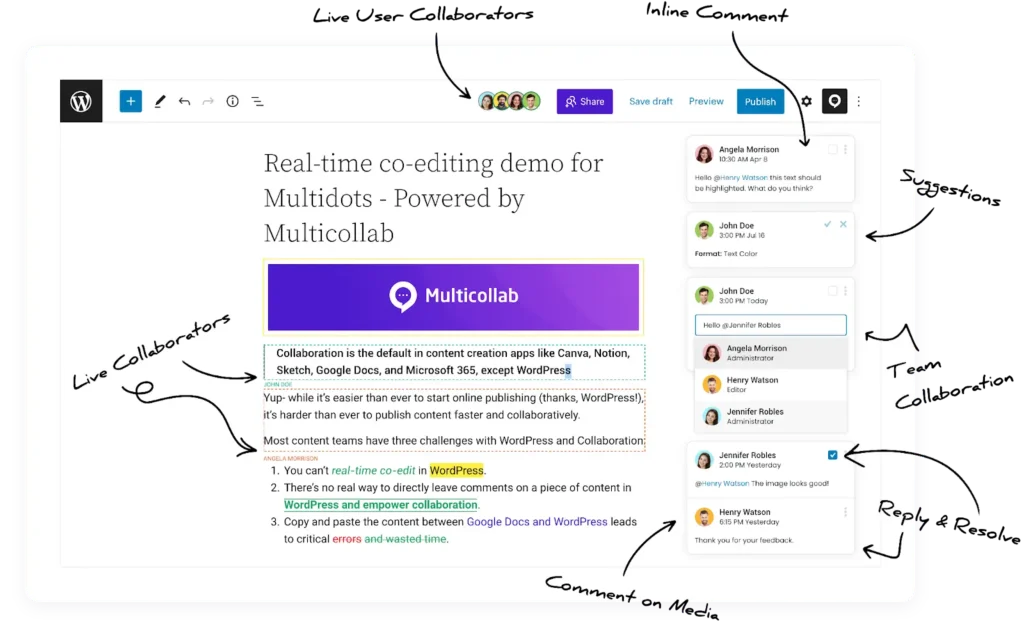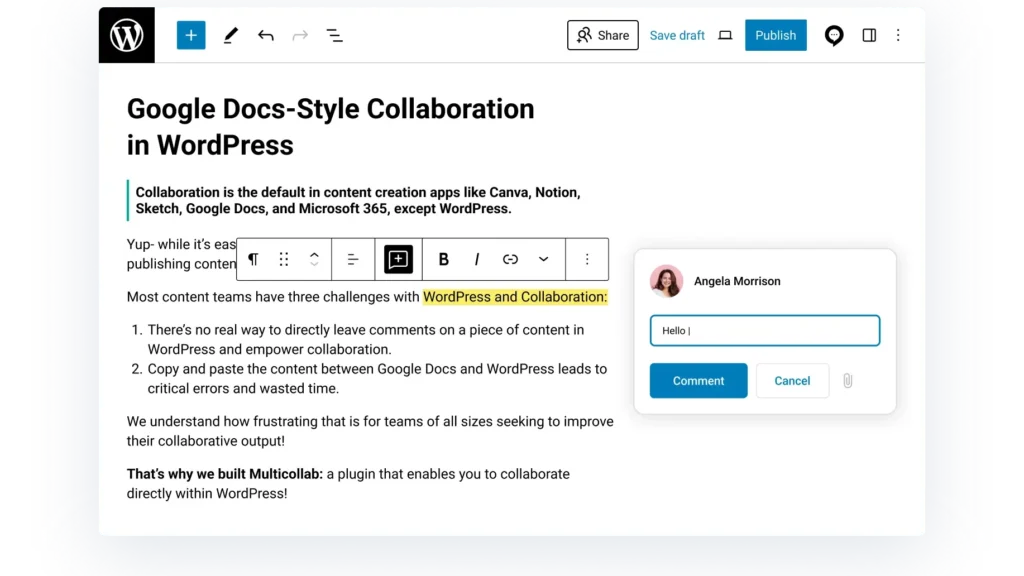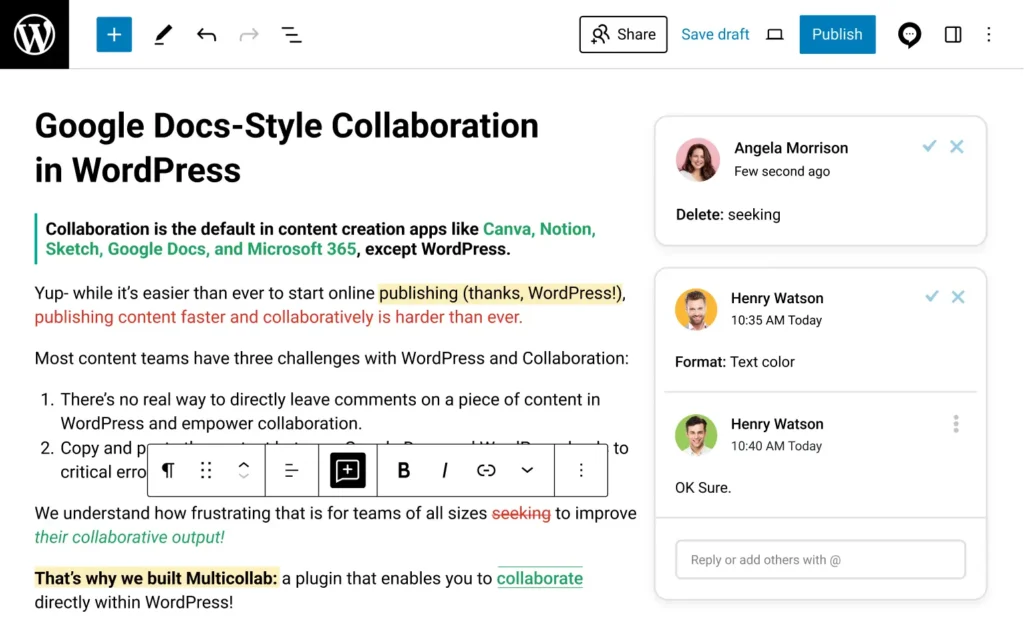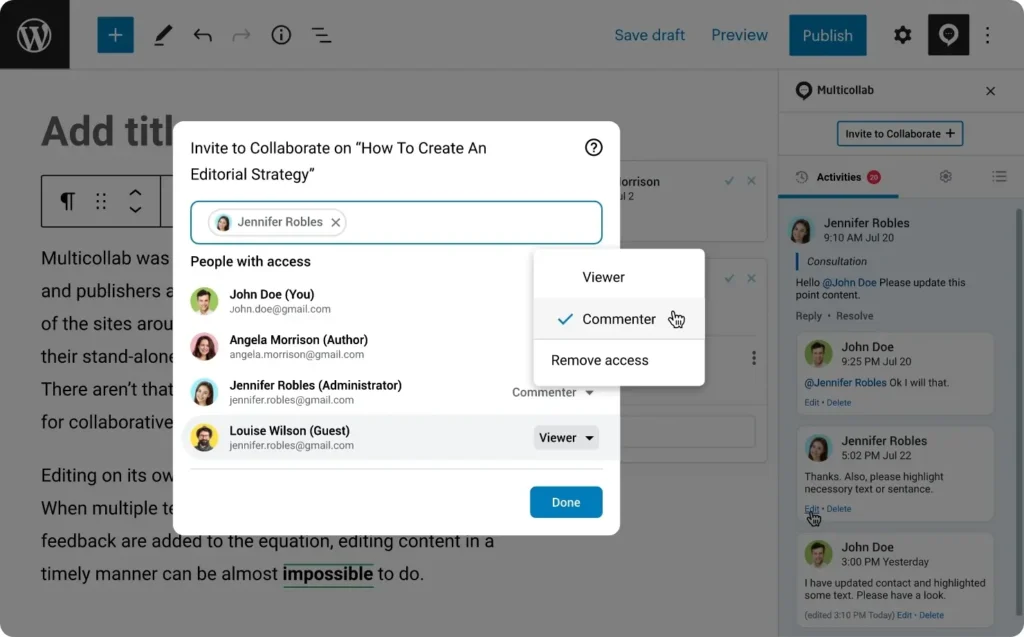Table of Contents
Team silos can be one of the biggest barriers to marketing success. They hamper creativity, slow workflows, and lead to duplicated efforts. Breaking down silos within your marketing department is essential to fostering collaboration, streamlining team content collaboration and maximizing results.
So, let’s explore actionable strategies to improve team content collaboration and ensure your marketing department works as a power unit.
How do team silos hinder team content collaboration?
Team silos occur when departments or individuals within a team operate in isolation rather than collaborating. In marketing, this often looks like:
- Content writers, designers, and strategists working independently without shared goals.
- Miscommunication or limited correspondence between teams responsible for campaigns, SEO, or social media.
- Inconsistent workflows that result in duplicated efforts or missed deadlines.
The impact of silos can be very damaging:
Lower productivity: Teams waste time chasing information or redoing work.
Misaligned goals: Without a shared vision, marketing efforts feel fragmented.
Reduced creativity: Limited collaboration means fewer opportunities for innovative ideas.
To achieve better team content collaboration, you must first break these silos and create a collaborative environment.
The benefits of seamless team content collaboration
When marketing teams collaborate effectively, the results can transform your content strategy:
Faster workflows: Tasks move seamlessly through content creation and approval workflow stages.
Higher content quality: Collaboration improves creativity, ensuring diverse perspectives are considered.
Improved morale: Team members feel aligned and valued when communication is open.
Greater ROI: A well-coordinated team produces impactful campaigns that resonate with your audience.
Now, let’s dive into actionable strategies to achieve this.
Actionable strategies to break silos and improve team content collaboration
1. Establish a unified content workflow
A unified content workflow ensures every team member knows their role and how tasks move through the pipeline.
- Map out your content creation process from ideation to publication.
- Define clear responsibilities for writers, editors, designers, and strategists.
- Use project management tools like Trello, Asana, or Monday.com to visualize tasks.
- CMS-focused collaboration tools like Multicollab can help in establishing a powerful content approval workflow.
- Incorporate regular team check-ins to identify bottlenecks and keep everyone aligned.
2. Foster a culture of open communication
Encouraging open communication is key to collaboration. Teams must feel empowered to share ideas, give feedback, and raise concerns without fear of judgment.
- Hold weekly brainstorming sessions.
- Use team collaboration tools like Slack or Microsoft Teams to keep discussions flowing.
- Encourage managers to lead by example, practising transparency and active listening.
3. Centralize your content assets
Scattered content assets can slow down collaboration and lead to wasted time. Centralizing your content ensures everyone has access to the materials they need.
- Use a cloud-based storage system like Google Drive, Dropbox, or SharePoint.
- Maintain a shared editorial calendar to track deadlines and campaigns.
- Label and organize assets with a clear naming convention to avoid confusion.
4. Implement real-time collaboration tools
Real-time collaboration eliminates delays in communication and approvals. Tools like Multicollab allow teams to work together seamlessly.
Benefits of real-time collaboration tools:
- Teams can provide feedback through inline comments and suggestion mode.
- Edits happen instantly, reducing the back-and-forth.
- Notifications keep everyone informed about updates.
Example: An editorial team working on a long-form blog post can use Multicollab to add comments directly in WordPress, ensuring designers, editors, and writers stay aligned without switching platforms.
5. Create structured feedback loops
Feedback is essential for high-quality content, but unstructured feedback can lead to confusion and wasted time. Structured feedback loops ensure clarity and efficiency.
- Set clear guidelines on how feedback should be provided (e.g., use suggestion mode, be specific).
- Define stages for feedback (e.g., first draft, post-edit, pre-publication).
- Use tools like Multicollab to centralize feedback and track revisions.
Pro Tip: Incorporate feedback sessions into your workflow to encourage team discussions and resolve issues collaboratively.
6. Break down goals into cross-team objectives
Marketing teams often have different sub-goals (e.g., SEO focuses on rankings, while social media prioritizes engagement). Align these goals into shared objectives to foster cross-team collaboration.
- Create a master marketing strategy that ties together individual goals.
- Hold quarterly strategy meetings to align teams.
- Use shared KPIs (e.g., campaign performance, content engagement rates) to measure success.
7. Invest in collaboration training
Even the best tools can’t replace the value of a well-trained team. Equip your team with collaboration skills to improve workflows.
Training ideas:
- Workshops on active listening and constructive feedback.
- Training sessions on new collaboration tools like Multicollab.
- Role-playing exercises to simulate common team scenarios.
Practical use case of an editorial team
Let’s look at how an editorial team can use Multicollab to improve collaboration and streamline content production:
Problem: Disconnected Processes
WordPress content teams often struggle with fragmented workflows where writers create drafts in WordPress, editors review them via email, and designers share assets on another platform. Feedback often gets lost, and deadlines are frequently missed.
Solution: Implementing Multicollab

Centralized collaboration: The team can use Multicollab’s inline commenting feature to review and provide feedback directly in WordPress.
Real-time updates: Suggestion mode allowed edits to be made instantly without disrupting the flow.
Streamlined notifications: Team members can receive email and Slack notifications, ensuring no updates are missed.
Role-based permissions: Editors and contributors can define access levels, improving content security and efficiency.
Activity tracking: With Multicollab’s reports and activity history, the team could monitor progress and ensure accountability.
Results:
- Feedback time reduced.
- Content production speed increased.
- Team morale improved as collaboration became seamless.
Why Multicollab is the ultimate collaboration tool for marketing teams
Multicollab is purpose-built to address the collaboration challenges faced by marketing teams. Here’s why it’s the ultimate tool:
Real-time collaboration
Collaborate directly within WordPress with instant updates. This ensures everyone is always on the same page, eliminating delays caused by external tools.
Inline comments
Add comments directly on specific parts of your content. This feature makes feedback clearer and more actionable, saving time spent deciphering vague suggestions.

Suggestion mode
Edit content without overwriting the original. Team members can review, accept, or reject suggestions, ensuring every change is intentional and aligns with the project goals.

Slack and email notifications
Stay informed without constantly checking WordPress. Notifications alert your team about updates, feedback, or approvals, keeping workflows efficient.
Role-based permissions
Assign specific roles to team members to control access and maintain content security. This is especially useful for large teams with varying responsibilities.
Activity tracking and reports
Monitor every edit, comment, and update with detailed activity logs. This transparency enhances accountability and ensures deadlines are met.
Guest collaboration
Invite external stakeholders to review and comment on content without giving them full WordPress access. Perfect for agencies working with clients.

Multilingual support
Collaborate effectively with global teams in 6 distinct languages – German, Chinese, Hindi, Spanish, French, and Bengali. Everything from comment boards to settings will automatically sync with your selected language so that you can experience streamlined collaboration.
Streamlined feedback loops
With Multicollab, feedback becomes a seamless part of the content creation process. Use inline comments and suggestion mode to simplify revisions and improve team alignment.
Start breaking silos today
Eliminating silos and improving team content collaboration requires the right mindset, strategies, and tools. By fostering open communication, centralizing assets, and using real-time collaboration tools like Multicollab, you can transform your marketing team to deliver their best.
Ready to take the next step? Discover how Multicollab can streamline your content workflows and empower your team to create impactful content.







